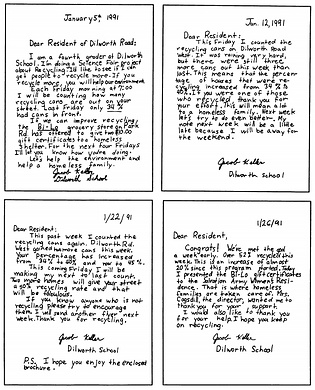
CAFÉ WASTE
Psychology is the scientific study of human behavior. An understanding of psychology can help us to answer our question of how to encourage students to limit waste in library cafes. Methods such as feedback and incentives are often used to promote particular behaviors. Previous studies that have used psychology to promote environmentally-friendly behavior include those by J. Jacob Keller and Linda Moon.
Keller
Keller, J.J. (1991). The recycling solution: How I increased recycling on Dilworth Road. Journal of Applied Behavior Analysis, 24(4): 617-619.
Results: On Dilworth Road West, where notes were delivered, 53% of homes recycled on Friday morning. On Dilworth Road East, where notes were not delivered, 35% of homes recycled on Friday morning. Therefore, people who were provided with feedback and an incentive were more likely to recycle.
Relevance to our question: This study is relevant to our question of how to get students to reduce waste in the library cafés because it shows that people are highly influenced by receiving feedback. We can use the results from this study to come up with our own ways of providing students with feedback in order to reduce their waste and promote recycling.
Moon
Moon, L. (2010). UC Berkeley outdoor campus recycling bins: Can we do better?
Results: The survey was open for one month and 134 students participated. Results show that students recycle less on campus than they do at home, which suggests this could be due to accessibility and awareness of the bins on campus.
Relevance to our question: Marcy suggested a main strategy that could be beneficial is to create new signs and information sheets for people in order to help raise awareness on how to recycle. We could use some of the tested designs from Moon's article on bins in our own library cafés. Signs should show what can be recycled, and recycle bins must be plentiful and easily accessible. If extra effort is needed to recycle, people are less likely to do so.
Psychology

